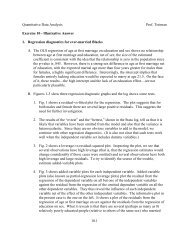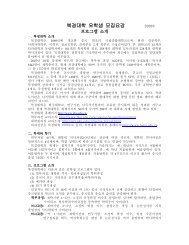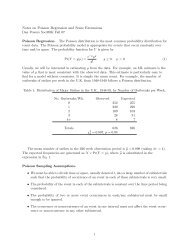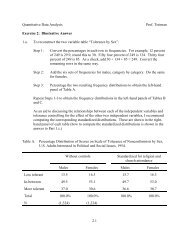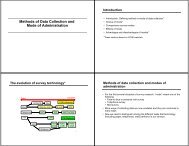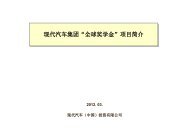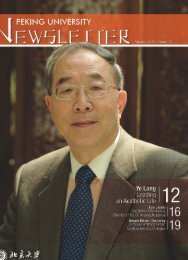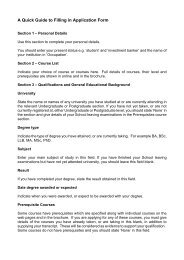Outline - London School of Economics and Political Science
Outline - London School of Economics and Political Science
Outline - London School of Economics and Political Science
Create successful ePaper yourself
Turn your PDF publications into a flip-book with our unique Google optimized e-Paper software.
LSE-PKU Summer <strong>School</strong> 2013LPS-GY201Urban Asia: Cities, Society <strong>and</strong> DevelopmentCourse <strong>Outline</strong>InstructorDr Hyun Bang ShinDepartment <strong>of</strong> Geography <strong>and</strong> Environment<strong>London</strong> <strong>School</strong> <strong>of</strong> <strong>Economics</strong> <strong>and</strong> <strong>Political</strong> <strong>Science</strong>Having joined the Department <strong>of</strong> Geography <strong>and</strong> Environment in 2008, Hyun Shin is a specialist in urbanAsia, focusing on the critical analysis <strong>of</strong> political economic dynamics <strong>of</strong> contemporary urban development<strong>and</strong> its socio-spatial implications. He is also an Associate at the Centre for Analysis <strong>of</strong> Social Exclusion, LSE<strong>and</strong> a Research Associate at the White Rose East Asia Centre, University <strong>of</strong> Leeds. He was a VisitingResearch Fellow at the Social Policy Research Centre, Chinese Academy <strong>of</strong> Social <strong>Science</strong>s (2002-2003)<strong>and</strong> also at the Asia Research Centre, LSE (2006-2007). He received his PhD (2006) <strong>and</strong> MSc (2000) fromthe LSE, <strong>and</strong> BSc (1994) from Seoul National University.He has many years’ experience <strong>of</strong> having carried out empirical research on East Asian cities. Recently, hewas the recipient <strong>of</strong> the STICERD/LSE Annual Fund New Researcher Award in 2009, which funded his twoyearresearch (May 2009 - July 2011) on the socio-spatial <strong>and</strong> political implications <strong>of</strong> the 2010 AsianSummer Games in Guangzhou, China. In 2012, he organised workshops in <strong>London</strong> <strong>and</strong> Santiago de Chile,together with colleagues from the UK, Chile <strong>and</strong> Argentina, on Towards an Emerging Geography <strong>of</strong>Gentrification in the Global South. These workshops were part <strong>of</strong> the Urban Studies Seminar Series (2011-2012),funded by the Urban Studies Foundation <strong>and</strong> the Urban Studies journal. He is currently involved inURBACHINA, a four-year international research collaboration funded by the EU Seventh FrameworkProgramme (FP7), <strong>and</strong> in a three-year project on investigating disparities in South Korea, working with threelocally based researchers with the funding support from the National Research Foundation <strong>of</strong> Korea.Course overviewThe course explores the contemporary dynamics <strong>of</strong> urbanisation in Asia, with special emphasis on cities inEast <strong>and</strong> Southeast Asia that have experienced rapid urban development with strong state intervention incity-making <strong>and</strong> economic development. Located geographically proximate, the economies in the regiondisplay some shared experiences <strong>of</strong> rapid urbanisation, export-oriented growth <strong>and</strong> strong developmentalstates, though their actual urban development outcome would be variegated due to geographical <strong>and</strong>historical specificities <strong>of</strong> places (e.g. transitional economies versus other capitalist late industrialisers).Applying interdisciplinary <strong>and</strong> comparative perspectives, the course encourages students to develop criticalknowledge <strong>and</strong> comparative underst<strong>and</strong>ing <strong>of</strong> how urban space is transformed in different social, economic<strong>and</strong> political settings, <strong>and</strong> what socio-spatial implications are made in a differentiated way upon localpopulations. The course will draw on various examples <strong>of</strong> urban policy <strong>and</strong> practice from cities across Asia,with emphasis on newly industrialised economies in East <strong>and</strong> Southeast Asia. The course will also benefitfrom the geographical advantage <strong>of</strong> taking place in mainl<strong>and</strong> China, <strong>and</strong> examine the differences as well assimilarities <strong>of</strong> urban development between Chinese <strong>and</strong> other Asian cities.Throughout the course, we ask whether the concepts <strong>and</strong> theories born out <strong>of</strong> the (post-)industrial Westernurban experiences can be applicable to the underst<strong>and</strong>ing <strong>of</strong> urban Asia. We also ask what are thechallenges that cities in East <strong>and</strong> Southeast Asia face, given its current development trajectory. We do thisby examining a set <strong>of</strong> carefully selected themes that address (a) the integration <strong>of</strong> Asian cities with the globaleconomy, (2) the distinctive characteristics <strong>of</strong> Asia’s urban development, <strong>and</strong> (3) the place-specificities <strong>of</strong>state intervention in forming urban growth strategies.
Recommended Preparatory Reading List• Campanella, T.J. (2008) The concrete revolution: China’s urban revolution <strong>and</strong> what it means for theworld. New York: Princeton Architectural Press• Hsing, Y-t. (2010) The great urban transformation. Oxford: Oxford University Press• Andrusz, G. et al (eds) (1996) Cities after socialism. Oxford: Blackwell• Forrest, R. <strong>and</strong> Lee, J. (eds) (2003) Housing <strong>and</strong> social change: East-West perspectives. <strong>London</strong>:Routledge• Logan, J.R. <strong>and</strong> Molotch, H.L. (1987) Urban fortunes: The political economy <strong>of</strong> place. Berkeley, CA :University <strong>of</strong> California PressPrerequisitesNoneAssessmentEssay: 50% (1,500 words)Final Exam: 50%Students are required to produce a 1,500-word assessed essay by the end <strong>of</strong> the course.There will also be a closed book final written examination with essay style questions.Course OverviewSession 1Globalising World, Accumulation <strong>and</strong> Urban AsiaSession 2Cities in Transition: Urban Change in (Post-)Socialist CitiesSession 3City-remaking: Politics <strong>of</strong> Urban Regeneration <strong>and</strong> Real Estate DevelopmentSession 4Housing, Home-ownership <strong>and</strong> Social ChangeSession 5Heritage Conservation <strong>and</strong> Urban TransformationSession 6Locating Gentrification in Urban Asian ContextsSession 7Financialisation <strong>of</strong> Everyday Life: Middle Class Living <strong>and</strong> Low-income HouseholdsSession 8Olympic Cities: Urban Spectacles, Mega-events <strong>and</strong> Mega-projectsSession 9Rural-urban interstices: Sub-urban Development <strong>and</strong> InformalitySession 10Sustainable Development <strong>and</strong> Future <strong>of</strong> Cities



